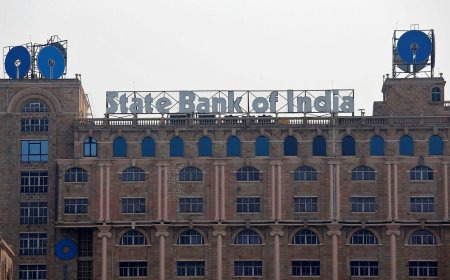FPIs Turn Sellers in June After Two-Month Buying Streak: Will Iran-Israel Tensions Trigger More Outflows?
After two months of net buying, FPIs turned sellers in June amid rising Iran-Israel tensions. Explore how geopolitical risks are impacting Indian markets and investor outlook.

FPIs Reverse Course in June After Buying Frenzy
Foreign portfolio investors, a key driver of capital inflows into emerging markets like India, had been net buyers for May and April, contributing to sustained market rallies. However, June saw a reversal as FPIs offloaded equities and debt securities, resulting in net outflows to the tune of approximately ₹15,000 crore (roughly $1.8 billion).
According to data from the Securities and Exchange Board of India (SEBI), the sharp sell-off came amid rising global uncertainties, with escalating geopolitical risks topping the list. The renewed tensions between Iran and Israel, marked by military strikes and retaliatory actions, have heightened risk aversion among global investors.
Geopolitical Risks: Catalyst for Market Nervousness
The Middle East has long been a geopolitical hotspot, and recent flare-ups between Iran and Israel have exacerbated concerns about regional stability. Market experts point out that these tensions threaten global oil supply routes and could potentially lead to spikes in crude prices, which historically weigh on emerging market equities.
“Geopolitical tensions such as those between Iran and Israel tend to trigger risk-off sentiments among global investors,” explained Sumanth Rao, Chief Market Strategist at Meridian Capital. “Emerging markets like India often bear the brunt as FPIs recalibrate their risk exposure, leading to capital outflows and increased volatility.”
Impact on Indian Markets and Economy
The FPI sell-off has been reflected in India’s major stock indices, with the Nifty 50 and Sensex witnessing modest declines in June. While domestic investor participation has provided some cushion, the absence of FPI support has dampened market momentum.
Moreover, the pressure on the Indian rupee has intensified, with the currency depreciating by nearly 1.5% against the US dollar during the month. This depreciation is partly attributed to foreign capital outflows and concerns over widening trade deficits due to elevated oil prices.
“Higher crude prices resulting from Middle East instability can exacerbate India’s import bill, impacting the current account and inflation,” said Dr. Neha Mehta, Senior Economist at the Indian Council for Research on International Economic Relations (ICRIER). “This environment could further deter foreign investors, leading to a vicious cycle of outflows and currency weakness.”
Analysts Weigh In: Is This a Temporary Phase?
While the immediate reaction has been bearish, market analysts urge caution against overgeneralizing the FPI behavior. Many emphasize that India’s robust economic fundamentals and ongoing reforms continue to attract long-term investment.
“Geopolitical shocks are episodic but not structural. We expect FPIs to return once the risk premium subsides,” said Rajiv Bhandari, Head of Equity Research at Axis Securities. “Investors should differentiate between short-term noise and long-term growth drivers like strong corporate earnings and fiscal consolidation.”
Still, the pace and severity of the conflict will remain a critical variable. Prolonged hostilities could prolong risk aversion, while de-escalation may pave the way for renewed capital inflows.
Investor Outlook: Navigating Uncertainty
For domestic and global investors alike, June’s FPI reversal serves as a reminder of the multifaceted risks shaping the Indian market landscape.
-
Short-term caution: Given the geopolitical overhang, investors may prefer quality stocks with strong balance sheets and export resilience.
-
Currency hedging: With the rupee under pressure, forex risk management will be essential for foreign investors.
-
Watch oil prices: Rising crude costs may translate into inflationary pressures, influencing RBI’s monetary policy trajectory.
-
Macro resilience: India’s steady GDP growth and domestic consumption trends provide a buffer against external shocks.
Government and RBI Response
The Indian government and the Reserve Bank of India (RBI) have expressed vigilance and readiness to intervene if market volatility escalates. Measures to stabilize currency markets, including foreign exchange interventions, are on standby, alongside policies aimed at maintaining investor confidence.
“India’s external vulnerability is manageable with ample forex reserves and prudent fiscal policy,” asserted RBI Governor Shaktikanta Das in a recent briefing. “We are closely monitoring global developments and will ensure orderly market functioning.”
The June shift in FPI flows underscores the sensitivity of emerging markets to global geopolitical risks, with the Iran-Israel tensions acting as a near-term trigger for capital outflows. However, India’s sound economic fundamentals and policy framework continue to make it an attractive destination over the medium to long term.
Investors are advised to stay alert, diversify portfolios, and adopt risk mitigation strategies as markets navigate through these uncertain times. The key to market recovery lies in the resolution of geopolitical tensions and the return of global risk appetite towards emerging economies.
What's Your Reaction?
 Like
0
Like
0
 Dislike
0
Dislike
0
 Love
0
Love
0
 Funny
0
Funny
0
 Angry
0
Angry
0
 Sad
0
Sad
0
 Wow
0
Wow
0













































































